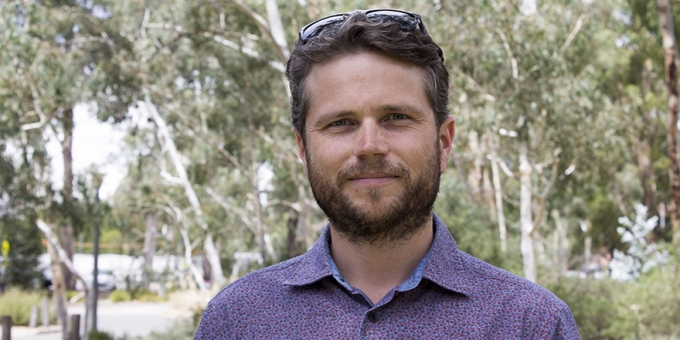ANU Research School of Electrical, Energy and Materials Engineering PhD student Will Logie has been recognised by renowned climate and renewable energy experts at the Asia-Pacific Solar Research Conference (APSRC).
His research focuses on reducing the cost of Concentrating Solar Thermal (CST) technologies, so they can become a viable and reliable source of renewable energy.
“The research I presented at APSRC is work I have been doing within the Australian Solar Thermal Research Initiative (ASTRI), focused on reducing the capital costs of CST technologies.”
The research recently received the Australian Solar Council Wal Read Memorial Award for Best Paper.
“If we can make CST power plants cheaper than current fossil fuel technologies, then their uptake as a reliable source of dispatchable renewable energy with storage in a decentralised National Electricity Market becomes more bankable.”
One way Will proposes this could be achieved is by using liquid sodium as a heat transfer fluid in a CST receiver, instead of current state-of-the-art molten salt.
“Whilst liquid sodium is a much more conductive material than molten salt, there are risks to using this product in an industrial setting – including fire and explosion hazards. I need to determine whether the performance benefits due to the better conductivity of liquid sodium outweigh the risks.”
In order to effectively understand the performance benefits of liquid sodium, Will has been spending time modelling CST receiver thermodynamics with a view to material constraints.
“The CST receiver model I outlined in my paper is a fast calculation of thermal-mechanical stress in CST receiver tubes. The fast approach fits into a larger model of CST systems and informs on the material limits of the receiver, given variables such as incident flux, tube size and heat transfer fluid flow.”
Will’s supervisor, Dr John Pye, has congratulated Will on the award.
“I think the award is really deserved. He’s been doing lots of computational fluid dynamics work up to now (and in his previous work) but this current paper was all about solid mechanics and thermal stress and represents a new theme in his work. There were three external reviewers involved in reviewing and nominating his paper, and they all came back with very enthusiastic comments about it.”
With just over a year to go until he completes his PhD, the award has provided Will with a motivational boost.
“I feel more confident and am encouraged to continue. So much of our time as PhD candidates is spent in uncertainty, so it is quite simply encouraging to have your work and the way you went about presenting it prized.”

